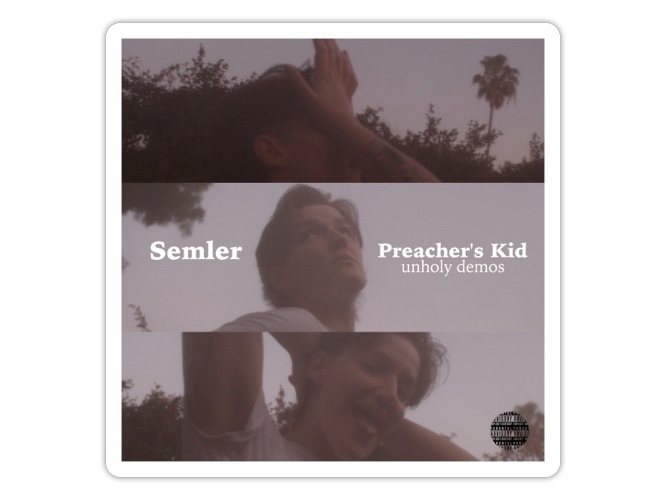“Preacher’s Kid”: the Gift of Grace

By Adeem Bingham, Staff Writer
A few months ago, one of my best friends went viral on the TikTok app. She was feeding hummingbirds from her hand and her mouth- a spiritual practice she perfected during the quarantine. That’s why I created for myself a TikTok account against every inclination that I did not belong on there.
Shortly after joining, I had a video on my timeline of one Grace Baldridge. Grace explained in the video that they were a preacher’s kid who performs under the artistic pseudonym Semler. They went on to say that they decided to release their upcoming album, “Preacher’s Kid,” as a Christian album, to see if a queer artist could top the Christian charts on iTunes. I immediately pre-saved the album to my Spotify and, frankly, forgot about it.
That is, I forgot about it until this week when I caught wind of a certain “Preacher’s Kid” album that was climbing the iTunes Christian charts. “The first song I learned spoke of Bethlehem / so is that Prophecy? Or is that brainwashing?” is the opening lyric of the first song, entitled “Bethlehem”.
I was 23 years old when I left the Christian Church. Prior to that, my entire existence and identity was defined entirely by my religious faith. “Bethlehem” immediately dives deep into the familiar complexity of parsing those contradictions with raw earnestness. It would be easy enough to fill this entire article with the lyrics, which read like a manifesto.
There is a concept of the “God-shaped hole” that is a familiar talking point in Christianity, and “Bethlehem” is a song that seems to dance around this hole. Actually, the dichotomy of feeling divorced from the faith of a God that rejects you, and in love with the poetry of a God who has endowed you with purpose and magic, is the intersecting point of the album.
“Jesus From Texas” really introduces this as the central theme. “My best friend found God, so we lost touch / I guess a Savior beats a friend who thinks you’re good enough / I hope she finds love and peace / and if her kid comes out, I hope that she calls me,” they sing with such brutal sincerity.
These dueling narratives of what Christianity is and of what it could be are irreconcilable – as demonstrated by Grace’s estrangement from their family. The theologian Matthew Fox describes it as the difference between a belief in “Original Sin” and “Original Blessing.” Is the Christian mythos one of scarcity or abundance? Grace has clearly decided with their declarative, “Oh, what a terrible honor it’s been to learn that my blessings are things you call sin.”
It is a folk album with ambient elements and passive vocals akin to Phoebe Bridgers or Sufjan Stevens; full of rich melodies and emotional swells that are distinctly reminiscent of the emotional triggers of your favorite worship band. It truly belongs on this chart with all of its questions and reflections on the specific culture of growing up Christian.
This is an album for Christians and especially for Christians who are privy to the traumas they have endured because of the faith. It welcomes earnest reflection on church culture and where it is damaging, and the many spaces where it lets down the very people it proposes to help. “Youth Group,” for instance, is a very funny song; it’s full of painful triggers, but it would’ve acted as a salve when I was much closer to occupying those spaces.
The songs on “Preacher’s Kid” are a rumination on shame and longing, on wholeness and belonging. It’s a portrait of where so many former Youth Group kids find themselves, estranged from a God of love over misinterpreted texts, and a culture so pregnant with patriarchy and misogyny that I shudder to think anyone outside of it could ever be convinced it was “good news.”
I will always have a softness for the Christian mythos. I still define so many of my values by scriptures that have been planted in me from childhood. It fills me with a special kind of hope to see a voice like Grace’s being catapulted to the top of the Christian charts. Because the Church needs to address the hard questions about Scripture, the damning reports of its systemic abuse, and a culture that promotes anything but humility, gentleness, and inclusivity.
Semler has created a collection of bold songs that act as the prophetic voice of a generation demanding a better culture. No more colonizing with ideology by way of missions trips. No more conversion therapy or pretending like heterosexuality is the only “natural” way of things.
“Preacher’s Kid” is an incredibly important album for so many people – even apostates like myself. I’m so grateful that teenagers in youth groups are getting to see a queer folk artist at the top of the chart with no need to disguise who they are. What a gift Grace has given us.
Listen to “Preacher’s Kid” on Spotify.